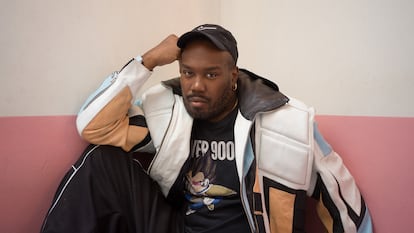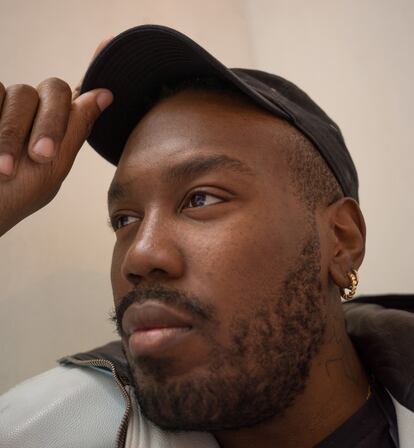Kiddy Smile: ‘Dance is the basis of everything, it should be learned from kindergarten’
The voguing star talks about his childhood, racism, homophobia, and the political message of dance

Kiddy Smile is a dancer, DJ, and designer. He is also a famous for voguing, a dance created by drag queens and trans women from racial minorities in New York in the early 1980s. The dance style imitates the poses of the models in fashion magazines and martial arts moves to disco or house music. Son of Cameroonian immigrants, Kiddy Smile grew up in a slum near Paris, and today he has a home in that city and another in Barcelona. On June 24, he is taking his show to the Canal Street musical cycle, at the Teatros del Canal in Madrid, on the eve of the city’s Pride festival.
Question. What was your childhood in the banlieue (housing projects) like? Was it hard?
Answer. The sad story of the boy who grows up in the projects and life is difficult .... No! The projects are home to people who have been pushed to the margins of society. Always being apart quickly makes people realize that only two things are respected: money and power, and power is linked to strength. There is no money in the projects, but you can achieve strength. That is why strength is respected. Unfortunately, homosexuality is considered a weakness. But if in the neighborhood you manage to accept who you are and understand that it is not a weakness, but a strength, there is no problem.
Q. In a famous video of yours, Let A B!tch Know, we see cars burning in the neighborhood while the kids are dancing and kissing.
A. What I meant to say was: “Imagine the youth we would have if it were simpler to be whatever we want without hiding.” So would a neighborhood where being LGBT was normal.
Q. Is that not the case?
A. It is not so visible. I always say that these neighborhoods are no more homophobic than affluent, Catholic neighborhoods. It is the same. But it stands out in places where there is more poverty.
Q. What did you find in dance?
A. It allowed me to get out of the projects. I wanted to go out and discover other things, but I didn’t know anyone outside.

Q. You’ve done fashion, singing, dancing...
A. Is it really different? It’s not as if I had worked in construction. I consider myself an artist who, in the course of my life, has acquired the tools to do what I do better. I tell stories that provoke an emotional response.
Q. Is there a political message?
A. It is not my aim, but existing is political, because of what I am and what I represent. If tomorrow I decide to go to a rural province to become a farmer, the very fact that nobody like me does that would make it something political — something that can be inspiring for others.
Q. What is the message? Because you might think that dance is just for fun...
A. If after millennia, there are people who still think that dance is just for fun .... All the arts that move the body are dance, including singing and theater. For me, dance is the basis of everything. It should be learned from kindergarten. What I have experienced during the day I will put into my movement later. I do not believe that there is movement without meaning.
Q. You were criticized for wearing a T-shirt that read, “Son of immigrants, Black and f-----,” when you performed at the Elysée Palace in 2018.
A. I am nobody in this world. What would be left of my visit to the Elysée? A photo that meant nothing? In one image, I had to keep control over what I wanted to say, which was to criticize the immigration law that was being debated at the time. I wanted to expose the complexity of who I am and why it was important to be there, and this included talking about my racial and sexual identity as well as my life’s journey.
Q. Is it still necessary to proclaim that you are the “son of immigrants, Black and [queer]”?
A. Everyone should say who they are and where they come from. They never ask you where you come from in Spain, do they? I, on the other hand, am constantly asked about it. “Where do you come from?” I always respond in a very lighthearted way, saying, “I’ve come from home right now”. If they insist, I say: “From the city of Rambouillet, in the department of Yvelines.” Deep down, they are asking me: “How is it possible that you are Black and French? What are you doing here?” Which means questioning my legitimacy as a French person. Then I either respond head-on, and say, “You’re asking a racist question.” Or I say, “I was adopted, and I don’t know where I came from.” A friend responds differently: “France colonized my country, it needed labor, my parents came to France, and that’s why I’m here.”
Q. You said it at the Elysée. You proclaimed where you came from of your own free will.
A. It was important to say it at the time. But everyone should always say where they come from.
Q. Did you follow the controversy in Spain about the racist insults toward the soccer player Vinícius in Valencia?
A. No. But for me, there are two types of racism. One is easily dismantled: emotional racism. You can be a racist and, after an hour with me, you will say: “Ah, but you are not like the others.” It’s not that you are racist, it’s that you have an opinion about a lot of people that you don’t know, and that has been constructed by society. By meeting me, I have blown this to pieces. The second racism is more complex: systemic racism, which consists of preventing entire groups from accessing the same rights as other people on the basis of race. Unfortunately, in historically and mostly white countries, these are systems that remain in place to keep some populations down and others up. Does Spain do this? All countries do. That said, historically you Spaniards have colonized quite a few countries in the world .... Is Spain racist? The answer is clear, but I will not say it. I live in Spain .... But Spain has something that is really cool: I am not afraid to hold hands with my partner in the street there.
Q. In France, you are?
A. In France, I wouldn’t do it, or if I did, I wouldn’t feel comfortable doing it. In Spain, I haven’t felt in danger.
Sign up for our weekly newsletter to get more English-language news coverage from EL PAÍS USA Edition
Tu suscripción se está usando en otro dispositivo
¿Quieres añadir otro usuario a tu suscripción?
Si continúas leyendo en este dispositivo, no se podrá leer en el otro.
FlechaTu suscripción se está usando en otro dispositivo y solo puedes acceder a EL PAÍS desde un dispositivo a la vez.
Si quieres compartir tu cuenta, cambia tu suscripción a la modalidad Premium, así podrás añadir otro usuario. Cada uno accederá con su propia cuenta de email, lo que os permitirá personalizar vuestra experiencia en EL PAÍS.
¿Tienes una suscripción de empresa? Accede aquí para contratar más cuentas.
En el caso de no saber quién está usando tu cuenta, te recomendamos cambiar tu contraseña aquí.
Si decides continuar compartiendo tu cuenta, este mensaje se mostrará en tu dispositivo y en el de la otra persona que está usando tu cuenta de forma indefinida, afectando a tu experiencia de lectura. Puedes consultar aquí los términos y condiciones de la suscripción digital.









































